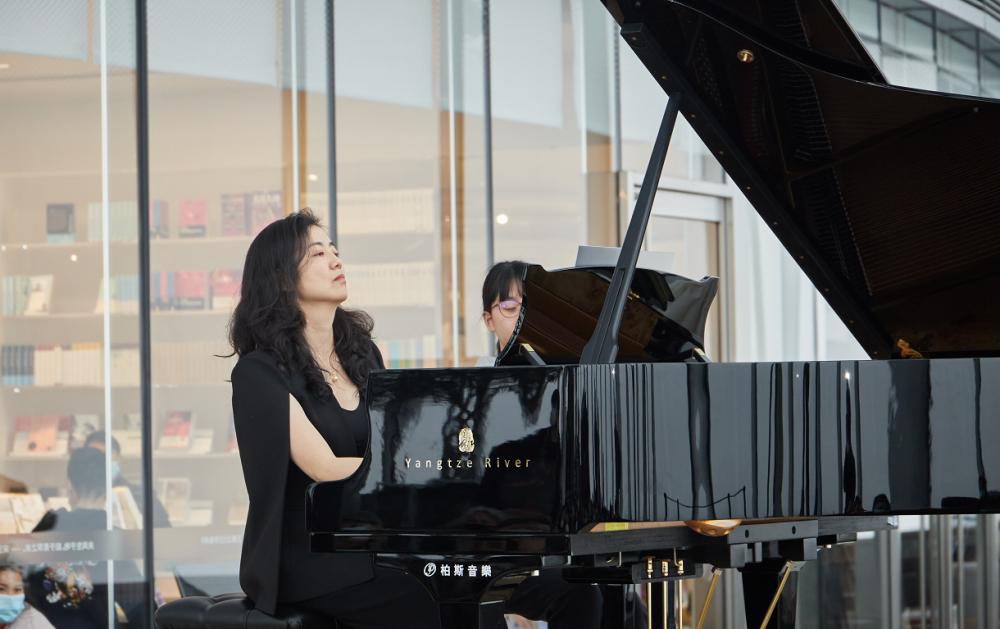
With the "Cloud Concert" once again playing the flagship store of Duoyun Academy, the highest bookstore in Shanghai, "Top of Shanghai" conveys a high Chinese voice. Nine young returnee pianists from Shanghai performed a series of well-known Chinese piano pieces, with the theme of "China on the Keys" to pay tribute to the century-old classics of Chinese piano.
Wang Lu, Zhu Haobing, Zhu He, Tang Jin, Zhou Yihao, Xie Jia, Xie Chengfeng, Yang Dongjin, Zheng Jiannan, all have a study abroad background, and have studied in Germany, Austria and the United States. Nine young pianists have successively brought "Spring Journey", "Caiyun Chasing the Moon", "Spring Dance", "Liuyang River", "Golden Snake Wild Dance", "Qing Turning Over", "Flowing Water", "Pinghu Autumn Moon", "Shandan DanHua Blossoms Red and Colorful", "Memories of the Homeland", "Shepherd Song", "Large-scale Production", "Autumn Moon", "Teasing", "Mountain Song", "Huan", "My Motherland", "Yellow River" and other Chinese classic piano pieces.
In the flagship store of Duoyun Academy, you can not only "look up at the clouds and look down at the book", but also enjoy the live concert, listen to the artist's perception of music, feel the unique artistic charm of the new cultural space, and show that the shanghai physical bookstore brand is constantly expanding and enriching the content and form of public cultural services.
In addition to the "Cloud Concert" series, the "Cloud Music Appreciation" series of activities has also been held in Duoyun Academy for three periods, combining musicians' live performances and their appreciation of music, aiming at a more diverse audience and bringing readers closer to art. Following the famous pianist Kong Xiangdong and China's top conductor Cao Peng, Professor Wang Yong, Dean of the School of Music of Shanghai University, led readers to review the development of revolutionary songs "from international songs to national anthems". He started from a group of popular revolutionary army songs, which belonged to the Eight Roads, the New Fourth, the Northeast Anti-Japanese League, and the South China Guerrillas, from the school music to the Northern Expeditionary Army song, from the introduction of the "International Song" to the creation of the "March of the Volunteer Army", from the Left-Wing Musicians Alliance to the Yan'an Lu Xun Art School, and reviewed the period of singing and weeping.
The familiar revolutionary songs bring everyone back to the war-torn era. "The Internationale is a common song of proletarians all over the world, and there are many different versions of this song, the original version is in French."
In 1871, france was defeated in the Franco-Prussian War, and the French government surrendered to the outside world, colluding with external forces to suppress the people's uprising. In March of the same year, the Paris workers revolted, quickly occupied the city, drove out the bourgeois government and established the proletarian power, the Paris Commune. In May of the same year, French government forces, with the help of foreign powers, launched an attack on the Paris Commune, which fell and ended in failure. Shortly after the defeat of the Commune, Eugène Baudhier, one of the Commune's leaders, composed the poem "Internacionale", which was sung using the tune of the Marseillaise. In 1888, the French workers' composer Pierre DeGuete composed the song for the Internationale, which was composed.
There are also twists and turns behind China's revolutionary songs. From "On the Songhua River" to "Flag Fluttering", "Anti-Japanese Song", and then to "March of the Volunteer Army", the latter was the theme song of the movie "Children of the Wind and Clouds". In the autumn of 1934, Tian Han wrote a long poem for the film, the last of which was selected as the lyrics of the theme song "March of the Volunteer Army", and shortly after the lyrics were written, Tian Han was arrested and imprisoned by the Kuomintang authorities. Soon after, the comrades who went to visit the prison brought the lyrics that Tian Han had written on the back of the cigarette box wrapper in prison, that is, the original manuscript of the "March of the Volunteer Army". At that time, Nie Er was preparing to take refuge in Japan, and when he learned that the movie "Children of the Storm" had a theme song to write, he took the initiative to ask for the song to be composed, and promised to send back the song manuscript as soon as possible after arriving in Japan.
Nie Er received the lyrics and quickly completed the first draft of the score. On April 18, 1935, after Nie Er arrived in Tokyo, Japan, he completed the final draft of the score and sent it to the Shanghai Dentsu Film Company at the end of April. Later, in order to make the song tune and rhythm more powerful, Nie Er and Sun Shiyi consulted and made 3 changes to the lyrics, thus completing the creation of the song. Since its birth, the March of the Volunteer Army has played a huge role in inspiring the patriotic spirit of the Chinese people. In 2004, the national anthem of the People's Republic of China was officially designated as the March of the Volunteer Army. "Music is not just about recording or resonating with an era, it may have more energy for the whole of history." Wang Yong said.
It is reported that the series of activities of "Cloud Concert" and "Cloud Music Appreciation" are sponsored by the Propaganda Department of the Shanghai Pudong New Area Committee of the Communist Party of China, the Shanghai Pudong New Area Culture, Sports and Tourism Bureau, the Shanghai Pudong New Area Federation of Literature and Art Circles, and hosted by Shanghai Century Duoyun Cultural Development Co., Ltd. and Shanghai Center.
Author: Xu Yang
Image source: Organizer
Editor: Wang Xiaoli
Editor-in-Charge: Huang Qizhe
*Wenhui exclusive manuscript, please indicate the source when reprinting.